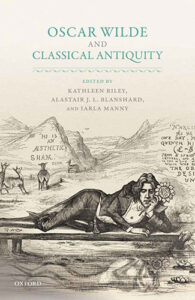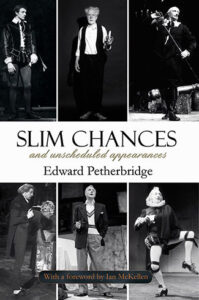Editor
 Oscar Wilde and Classical Antiquity
Oscar Wilde and Classical Antiquity
Edited by Kathleen Riley, Alastair J. L. Blanshard, and Iarla Manny
Oxford University Press
Published 2017
ISBN: 9780198789260
Few authors of the Victorian period were as immersed in classical learning as Oscar Wilde. Although famous now and during his lifetime as a wit, aesthete, and master epigrammist, Wilde distinguished himself early on as a talented classical scholar, studying at Trinity College Dublin and Oxford and winning academic prizes and distinctions at both institutions. His undergraduate notebooks as well as his essays and articles on ancient topics reveal a mind engrossed in problems in classical scholarship and fascinated by the relationship between ancient and modern thought. His first publications were English translations of classical texts and even after he had ‘left Parnassus for Piccadilly’ antiquity continued to provide him with a critical vocabulary in which he could express himself and his aestheticism, an intellectual framework for understanding the world around him, and a compelling set of narratives to fire his artist’s imagination. His debt to Greece and Rome is evident throughout his writings, from the sparkling wit of society plays like The Importance of Being Earnest to the extraordinary meditation on suffering that is De Profundis, written during his incarceration in Reading Gaol.
Oscar Wilde and Classical Antiquity brings together scholars from across the disciplines of classics, ancient history, English literature, theatre and performance studies, and the history of ideas to explore the varied and profound impact that Graeco-Roman antiquity had on Wilde’s life and work. This wide-ranging collection covers all the major genres of his literary output; it includes new perspectives on his most celebrated and canonical texts and close analyses of unpublished material, revealing as never before the enduring breadth and depth of his love affair with the classics.
Reviews
‘Oscar Wilde and Classical Antiquity powerfully demonstrates the degree to which Wilde’s reading fueled the development of a mind that “could feel itself alive” only through encounters with literature.’ – Rebecca N. Mitchell, Victorian Studies
‘Oscar Wilde and Classical Antiquity offers new perspectives on his most celebrated and canonical texts by adopting a uniquely multidisciplinary approach with insights into Wilde’s classical sources that will be highly useful for in-depth studies of Oscar Wilde. Oscar Wilde and Classical Antiquity delineates the influence and breadth of Wilde’s knowledge in the Classics, offering specific examples in the original Greek, French, Latin, and English that provide excellent source material for Wilde’s fascinating essays, plays, and his novel. Oscar Wilde and Classical Antiquity has a comprehensive bibliography and provides a lasting contribution to Wildean scholarship.’ – Annette M. Magid, Papers on Language and Literature
‘An excellently edited volume … of the highest scholarly standard, which will no doubt be of interest to both Wilde scholars and classicists.’ – Xavier Giudicelli, Cahiers victoriens et édouardiens
‘Wilde emerges as interesting, brilliant, sharply witty, complex, both idealistic and cynical, but a dedicated classicist, sadly out of step with the mores of most of his contemporaries. … his love affair with the Classics continued until he died, as this collection of essays amply demonstrates.’ – Jo-Marie Claassen, The Classical Journal
‘Individual essays explore Wilde’s classical education, the shaping influence of his experience as a spectator of classical drama, the impact of his classical training on his philosophy and fiction, and the significance of Roman antiquity in his writings.’ – Andrea Henderson, Studies in English Literature
‘The book adeptly fulfills its mission statement “to demonstrate in what ways Wilde’s classicism is typical, in what ways heterodox or distinctive, and where it is situated in relation to Victorian social and intellectual frameworks” . . . The assembly of Victorianists and Classicists from multiple disciplines . . . has created a multifaceted successor to Iain Ross’s Oscar Wilde and Ancient Greece (2013), and offers new contributions not only to studies in Oscar Wilde and the late Victorian period, but also reciprocally to Classics.’ – Julianna K. Will, Bryn Mawr Classical Review
‘This is a highly satisfying book, stimulating, varied, visually appealing, refreshingly jargon-free and exceptionally well edited. . . . It has much to offer anyone interested in the enigma of Wilde.’ – Peter Raby, The Classical Review
‘Eighteen years after the centenary of Oscar Wilde’s death in 1900, Oxford University Press has published this excellent monographic study . . . an excellent and highly recommended contribution to Wildean studies from the perspective of the classical tradition.’ – Pau Gilabert, International Journal of the Classical Tradition
‘I greatly enjoyed the varied viewpoints of these illuminating essays, which greatly deepened my understanding of Wilde’s complex love and use of Classics and can heartily recommend the book to scholars and post-graduate students of Classical Reception, English Literature and Theatre Studies. The volume amply fulfils its stated aim of offering a model for studies based around an individual and their use of the Classical tradition.’ – Claire Gruzelier, Classics for All
‘The analysis and inclusion of a variety of sources, including unpublished, annotated manuscripts, transcripts, and Wilde’s notebooks, are an invaluable resource and welcome additions to ongoing discussions on Wilde. . . . the debates present are original, well-conceived and offer readers a concrete position from which to expand and further consider Wilde’s classicism.’ – Robert Finnigan, The Review of English Studies
 Slim Chances and Unscheduled Appearances
Slim Chances and Unscheduled Appearances
By Edward Petherbridge (with a Foreword by Sir Ian McKellen)
Edited by Kathleen Riley
Indepenpress
Published 2011
ISBN: 9781780031255
Stoppard’s original Guildenstern, a heartbreaking Newman Noggs and a definitive Lord Peter Wimsey, Edward Petherbridge is one of Britain’s finest and most highly respected actors. In a distinguished career spanning more than half a century he has proved equally at home in Greek tragedy and French farce, in Shakespeare and Chekhov, Moliere and O’Neill, Beckett and Bennett, Coward and Kurt Weill.
In this fascinating collection of essays, he tells the story of his life in the theatre (low ebbs included), from his first acting lesson, watching Norman Evans in Humpty Dumpty at the Bradford Alhambra, and his early years in ‘tatty’ rep, through his frustrations and triumphs at the Old Vic under the leadership of Laurence Olivier, to his role in the formation of the democratic Actors’ Company and his membership of the Royal Shakespeare Company. Along the way he recounts several ‘unscheduled’ appearances, in Peter Brook’s Oedipus, for instance, and in Wormwood Scrubs as a young conscientious objector.
Part memoir and part master class, this unique anthology of prose and poetry, lavishly illustrated throughout by Petherbridge’s own artwork and many rare photographs, is a wonderfully entertaining, incisive and often moving exposition of the very heart of the mystery of acting.
Reviews
Edward Petherbridge has produced a charming and insightful narrative, full of humour, theatrical lore and honesty. A must for anyone interested in 20th-century theatre.’ – A. L. Kennedy
‘I’ve become addicted to reading several pages a day, partly because the anecdotes are so hilarious and treasurable … he is so intelligent and so interesting … The text is stuffed with long poems for special occasions, schoolboy reminiscences, analytical diversions and brilliant portraits of his fellow actors – there’s even a verbatim dialogue with McKellen – and the passages on the National under Olivier are priceless.’ – Michael Coveney
‘Reading Slim Chances is like getting the opportunity to sit down with Petherbridge and talk – it reads like a chat with an old friend, right down to the footnotes.’ – Washington Independent Review of Books
Slim Chances and Unscheduled Appearances, although largely based on personal reminiscence, can also be read as a collection of documentary essays. It is an actor’s attic of a book, packed with dusted-down complaints, belated tributes, a few apologies, ancient but still functioning theories, and, most interestingly, technical minutiae. Petherbridge knows about casting, lighting, rehearsals and musical accompaniment. Most of all he knows about timing. – Times Literary Supplement
